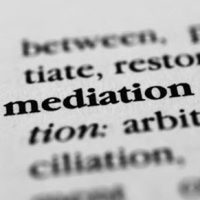Addressing Marital Misconduct During Divorce Mediation in Georgia

If you know that your ex has committed marital misconduct during your marriage, you might be unsure of how to address this issue during mediation. Mediation occurs outside of court, and it is less formal. However, you can still discuss issues like substance abuse, child abuse, adultery, concealing assets, and various other forms of misconduct. Where will these discussions lead? How do you achieve positive results during this type of divorce mediation in Georgia?
The Benefit of Discussing Marital Misconduct in Private
Discussing marital misconduct during private negotiations is extremely beneficial. Unlike a public trial, these discussions will not go on public record when you choose mediation. This gives both spouses the chance to address the allegations in a calm, professional manner without excessive stress or the exposure of private matters to the general public.
Spouses can also deal with alleged misconduct in their own way rather than relying on family courts for justice. For example, you might admit to certain misconduct and agree to some kind of financial penalty. This could save you from more serious consequences enforced by a family court judge.
Private negotiations are easier to keep confidential compared to trials. In a worst-case scenario, your children may hear about the details of this misconduct after a trial. This misconduct could involve embarrassing information that alienates family members and causes considerable stress.
Using Marital Misconduct as Leverage During Mediation
In some cases, you may use marital misconduct as leverage during divorce negotiations. If your spouse desperately wants to keep certain information off the public record, they may be more willing to accept certain concessions and compromises. For example, your spouse may have a substance abuse problem. They might want to keep these issues under wraps, so they are not at risk of colleagues, friends, and family finding out by virtue of their addiction being discussed in publicly recorded documents. As a result, they may agree to a less favorable settlement.
Lawyers Cannot Threaten Charges on Your Behalf
While leverage can be helpful, you must be very careful to avoid making direct or veiled threats during negotiations. If you threaten to reveal incriminating or embarrassing acts, you could face legal consequences for blackmail or extortion. Remember, threatening to reveal someone else’s crimes to gain money is illegal in the United States.
In addition, your lawyers cannot help you with this strategy. The Georgia Rules of Professional Conduct prohibit lawyers from threatening to present criminal charges to gain an advantage in a civil case. This is forbidden even if they simply “participate” in your threatening behavior.
Where Can I Find a Divorce Mediation Lawyer in Atlanta?
If you’ve been searching for a divorce mediation lawyer in Atlanta, look no further than Kaye, Lembeck, Hitt & French. We have spent our entire careers assisting divorcing spouses like you. Marital misconduct is a common subject during divorce negotiations – and it’s important to address it in a confident, lawful, and effective manner. To learn more about your next steps in the mediation process, book a consultation with one of our experienced lawyers today.
Sources:
law.uga.edu/sites/default/files/uploaded-files/Georgia%20Rules%20of%20Professional%20Conduct%20%28Panel%20%232%29.pdf
gbi.georgia.gov/document/document/gcic-cch-offense-codes-2020-master-list-excel/download
